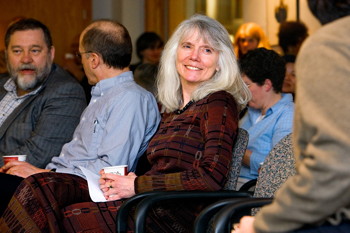END NOTE
Kenney shares library's philosophy: 'Think locally, act globally'

Anne Kenney, Cornell's Carl A. Kroch University Librarian. See larger image
Anne Kenney, Cornell's Carl A. Kroch University Librarian, chatted with Ezra magazine recently about Cornell University Library's changing roles, the vast reach technology's infrastructure has made possible and what the future may hold.
What roles does Cornell University Library play today in the lives of students?
The library continues to draw more and more students through its doors every year even as the number of online library users has skyrocketed. The 4.5 million visits to library spaces in 2010-11 averages out to 150 visits per person. Most of those visits are from students – grads and undergrads alike. They come to study. They come to access resources, physical and digital. We still top a million physical transactions a year, and interlibrary borrowing is up sharply. They come to consult with our superb staff (84,000 times!) and, yes, they come to drink coffee (more than 300,000 cups sold last year). In a survey of graduating seniors, the library retained its top spot among student services and facilities for student satisfaction, with a total of 96 percent of responders being either satisfied or very satisfied. Eighty-five percent of seniors in 2012 reported that the library contributed to their academic success and efficiency. We're also the second-largest student employer on campus – nearly 500 students perform critical functions.
Has the library adopted new ways of interacting with students and faculty in the last few years?
Absolutely. We're very active on Facebook and Twitter. We also do a tremendous amount of outreach about our virtual libraries, and we're part of a 24/7 chat consortium that allows people to ask reference questions. Our librarians even answer reference questions via text message now.
How do collaborations like the 2CUL partnership with Columbia affect the library?
Most people are familiar with the bumper sticker "Think globally, act locally." We think it should be stated the other way around: "Think locally, act globally." In this highly networked world, with more scholarly resources being created every day, we can no longer assemble everything our faculty and students need to succeed academically. So we partner with research libraries around the world to provide our faculty and students with what they need. The partnership with Columbia University is a good example of this. There is only a 35 percent duplication rate between their libraries' collections and ours, which means that through this partnership, we're now able to offer the Cornell campus 65 percent more unique materials than we were able to previously. We're also partnering with the rest of the Ivies to enhance interlibrary lending and to build complementary holdings. I think our focus is not to compete with other leading libraries to have the biggest collection, but together to reduce the delta between what is published and what we collectively can identify, make available now and preserve for future generations.
Can you describe your vision of Cornell University Library 10 years (or 20? 50?) from now?
It's hard to predict what 3 years out will look like, let alone 10 or 20 or 50! When Olin Library opened in 1961, it was built to house more than 2 million books. Yet some likened its façade to an IBM punch card, foretelling a future much driven by technology. At that time, something like 30 percent of IBM's business was in selling blank punch cards. Imagine if they, and we, had banked on a future in which punch card computing continued to dominate technological advances! I do firmly believe that the research library will remain at the very core of the university. We will become even more essential in empowering Cornell's research and learning community as it grapples with changes in technology, intellectual property rights, data-intensive research and scholarly communication practices. The library is and will remain a neutral and trusted part of the university supporting information access, creative expression and new scholarship.